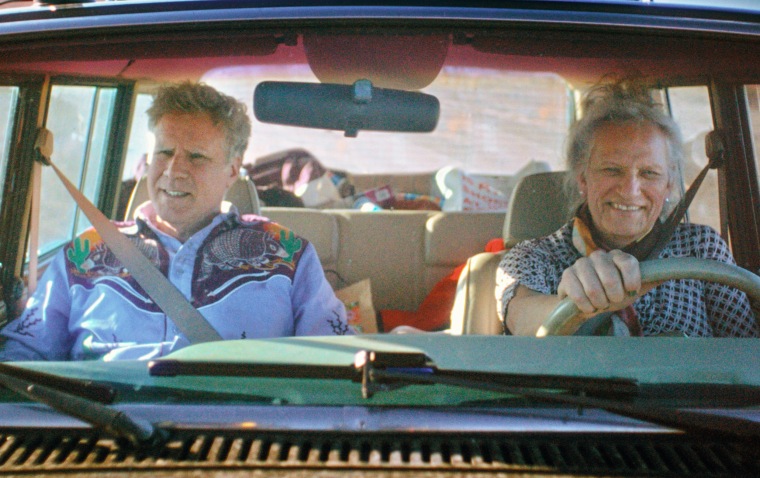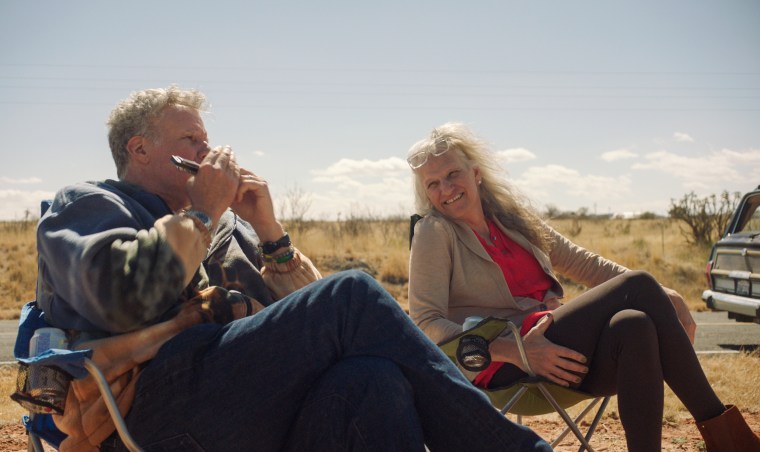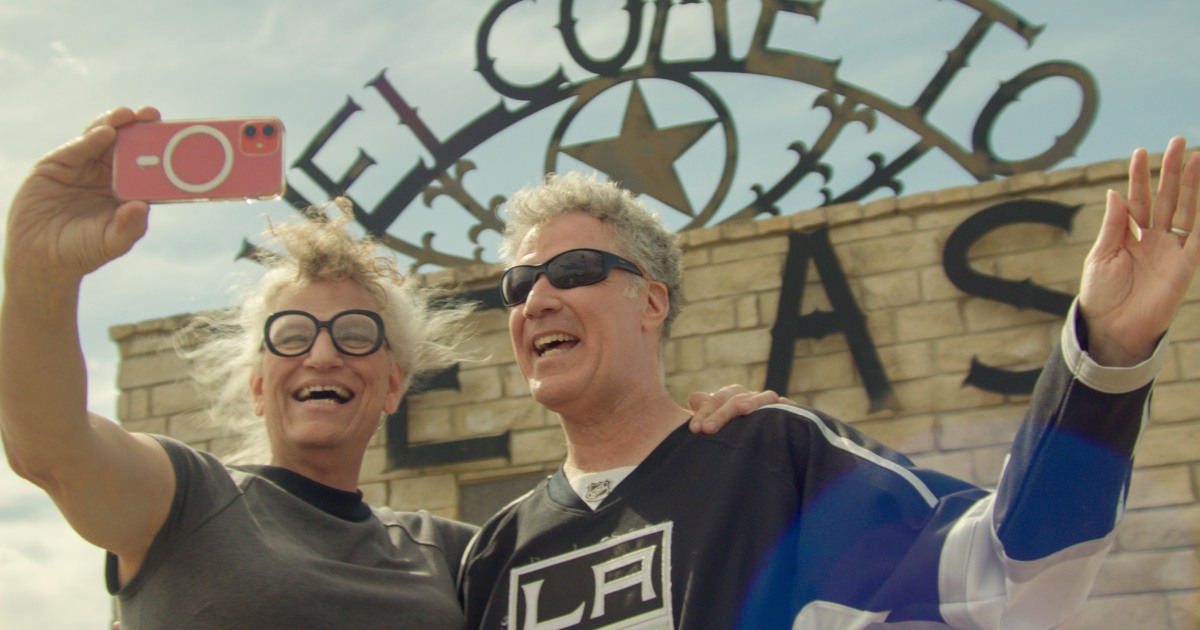About halfway through director Josh Greenbaum’s new road trip documentary, “Will & Harper,” comedian Will Ferrell looks across the car at his longtime friend and collaborator Harper Steele and says, already laughing, “Here’s a question: Do you think you’re a worse driver as a female driver?”
At that point, the pair is over a week into the 16-day cross-country tour that serves as the basis for the film, which explores how coming out as transgender can change a friendship, set to a soundtrack of heartfelt road-worthy tunes. And Steele’s faux-exasperated “f— you” in response signals just how far the friends, who met in 1995 on the set of NBC’s “Saturday Night Live,” have come from the first day of the trip.
“Josh had warned us that it’s going to feel weird the first couple days but, by the third day, you’re going to forget the cameras are there. And it’s really true,” Ferrell told NBC News of filming the documentary, which releases Friday on Netflix, in an interview with Greenbaum and Steele. “On that third day, you really settle into just hanging out the way you would if there weren’t cameras there, and I think that corresponds with what you see.”

While it takes slightly longer for Ferrell to start making jokes about women drivers and Steele’s “rack,” they’re headed in that direction by the time they make it from New York to Indiana — where they watch the sun set in a Walmart parking lot, with a comical array of Pringles — around the three-day mark. And eventually, what starts out as a series of cautious conversations about the basics of transitioning develops into touching and often amusing dialogues about mental health and living authentically as they make their way deeper into the Midwest and turn south, en route to California, in Steele’s vintage wagon.
“There really wasn’t a question as to whether there would be humor involved. Would anyone else think we’re funny? We didn’t know, but, boy, we sure crack ourselves up. And we’re lucky that the audience, for the most part, seems to think the same,” Ferrell said, before Steele quipped that it was still unclear whether viewers were laughing with them or at them.
“That’s our language — that’s how we met — making jokes to each other,” Ferrell said, explaining that, while they knew making the documentary “was not going to be an easy endeavor,” they weren’t afraid because of their history. “The wonderful surprise is that we met through humor but, as we got to know each other, we had really great emotional talks about other subjects.”
The road to “Will & Harper” started in 2021, when Steele sent a letter to her close friends and family, letting them know that she would be transitioning. In response, Ferrell wrote back a message of support, adding that he’d like to talk about it sometime. When he said that, of course, neither of them were picturing talking about it on camera for a highly publicized documentary with a festival rollout.
“It was Will’s idea, which I said no to pretty quickly,” Steele said of Ferrell suggesting they tape themselves getting reacquainted while traversing the country by car. “And then, I gave it about a summer to think about it. I started talking to Will, and then we dragged in Josh, and we all talked about what shape it would take.”
A large part of why it took her time and several conversations to sign on, the former head writer of “SNL” explains in the press notes for “Will & Harper,” is that she much prefers to be behind the scenes. But the sense that doing the documentary could help other trans people, as well as push her to be in spaces that felt scary to be in after coming out, ended up trumping her hesitancy about being in front of the camera. And once she was on board, she said, she embraced the opportunity to talk openly on film about her transition.
“I was never too afraid to talk about myself,” she said. “When you come out as trans, you’re introducing a kind of vulnerability that turns out to be very special, so I leaned into it.”

Once Steele agreed to the project, she and Ferrell mapped out a route that included spots she had gone to on her many previous road trips around the country before transitioning and places from her past. And Greenbaum, whose other features include “Too Funny to Fail” and “Barb and Star Go to Vista Del Mar,” enlisted a crew to help him capture the two taking in local attractions — like a Pacers game in Indianapolis, a restaurant that serves a 72-ounce steak in Texas and a hot air balloon ride in New Mexico — or simply enjoying a beer and a view from Steele’s handy fold-out chairs.
Between each stop, the friends discuss topics like why Steele landed on the name Harper, her experiences with top surgery and gender dysphoria, and Ferrell’s love of Dunkin’, all while being filmed by a camera mounted on the hood of Steele’s car. And on the way to places where Steele wonders if she’s still welcome, like a rural dive bar and a stock car race, they talk about their shared sense that much of the country has become unsafe for transgender people — something that was also top of mind for Greenbaum while making the film.
“On one level, it was great that we all knew each other. But there was another layer that I wasn’t used to, which was that I’m not just thinking about what’s good for the story; I want to protect my friends and make sure they’re literally, physically safe,” Greenbaum, who’s known Ferrell and Steele for years, told NBC News of filming his first documentary with his friends as the subjects.
Adding that he was also aware of making sure Steele and Ferrell were “emotionally protected” when he was editing the film, he said, “But I just followed their lead, because, as you see in the film, they’re so open and vulnerable. I knew that it was a safe place to start from — showing exactly what happened on this trip, both the good and the bad.”
The bad moments that Greenbaum alluded to usually happen when Ferrell and Steele are caught off guard by unwanted attention, like at the Texas steak house where they attract a voyeuristic crowd. But there are many more good moments to balance those out, including both the lighthearted and heavy conversations that bring Ferrell and Steele closer together and their interactions with people across the country who demonstrate that things are actually changing for the better — like a run-in with a group of college kids doing a tour of Washington, D.C., which didn’t make it in the film but stuck with Ferrell.
“Of course, when people saw the cameras, they’d come up. When they see a super famous, A-list celebrity, they want to know what [is going on],” Ferrell said with a sly look, momentarily breaking from the story to get a rise out of Steele and Greenbaum, who groaned in response.
“When we explained, ‘I’m with my friend Harper, and she just transitioned,’ it wasn’t even a question to them. They were, like, ‘Oh, how are you, Harper? Great to meet you,’” he said. “I’m not trying to say that we don’t need to work on acceptance. But that really struck me — that for people in their late teens, early 20s, it was very natural.”
Looking at her friend, briefly, without a trace of sarcasm, Steele agreed, “It was very hopeful.”
For more from NBC Out, sign up for our weekly newsletter.

Leave a Reply